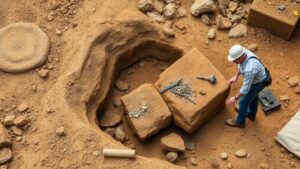How Regional Historical Societies Can Help Treasure Hunters
How Regional Historical Societies Can Help Treasure Hunters
The relationship between treasure hunters and regional historical societies can be symbiotic, offering benefits to both parties. This article explores the vital role that these societies play in supporting treasure hunters, emphasizing collaboration, knowledge sharing, and community engagement.
The Role of Regional Historical Societies
Regional historical societies are organizations devoted to preserving, researching, and promoting local history. They are often comprised of historians, archivists, volunteers, and community members who are passionate about their regions past. By utilizing their repositories of knowledge and resources, these societies can assist treasure hunters in several significant ways:
- Access to Historical Data: Societies maintain archives that include maps, photographs, and documents which can provide invaluable context for identifying potential treasure locations.
- Networking Opportunities: They can connect treasure hunters with other enthusiasts and experts, fostering collaboration and shared discoveries.
Historical Context and Integrity
Understanding the historical significance of a site is crucial for treasure hunters. Regional historical societies often conduct extensive research about local historical events, figures, and industries. For example, the Rhode Island Riding Academy, established in the mid-19th century, exemplifies how treasure hunters can benefit from knowing the historical activities that took place in a region.
Also, historical societies might emphasize the importance of preserving local heritage. This aspect encourages responsible treasure hunting practices that ensure the protection of archaeological sites and artifacts.
Case Studies
Several successful partnerships illustrate the potential of historical societies aiding treasure hunters:
- Floridas Historic St. Augustine: In 2017, the St. Augustine Historical Society partnered with local treasure hunters to document artifacts recovered from the sea floor off the coast of this historic city. Through their collaboration, over 300 significant relics were properly cataloged and preserved for educational purposes.
- The Minnesota Historical Society: In a 2019 initiative, the society provided guidelines for metal detecters to locate and report findings from the Minnesota River Valley. They subsequently organized exhibitions to showcase artifacts, enhancing public awareness and appreciation of local history.
Educational Workshops
Another way that historical societies aid treasure hunters is by offering educational workshops focused on best practices, legal considerations, and historical research techniques. These workshops often cover:
- Legal Frameworks: Educating treasure hunters about local laws regarding artifact recovery and reporting.
- Research Techniques: Helping hunters refine their skills in locating relevant historical resources.
By learning the correct methodologies, treasure hunters can elevate their efforts from mere hobbyism to contributing to the broader understanding of history.
Benefits to the Communities
The cooperative efforts between treasure hunters and regional historical societies also serve to enhance local communities. According to a 2020 study conducted by the History Channel, community engagement in local heritage enhances civic pride and tourism. Through exhibitions of artifacts discovered by hobbyists, historical societies can stimulate interest in local history and attract visitors, resulting in economic benefits for the region.
Conclusion and Actionable Takeaways
To wrap up, regional historical societies play a pivotal role in aiding treasure hunters by providing essential historical context, facilitating educational opportunities, and promoting responsible recovery practices. As a treasure hunter, consider the following actions:
- Join your local historical society to access archives and networking opportunities.
- Participate in educational workshops offered to enhance your treasure hunting skills.
- Collaborate with historians to document your finds, enriching the local historical narrative.
By embracing these collaborative efforts, treasure hunters not only further their pursuits but also contribute to the preservation and appreciation of local history.


